Phylum nematoda - Study guides, Class notes & Summaries
Looking for the best study guides, study notes and summaries about Phylum nematoda? On this page you'll find 93 study documents about Phylum nematoda.
All 93 results
Sort by
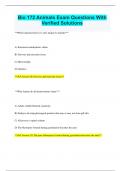
-
Bio 172 Animals Exam Questions With Verified Solutions
- Exam (elaborations) • 20 pages • 2024
- Available in package deal
-
- $9.99
- + learn more
Bio 172 Animals Exam Questions With Verified Solutions **Which characteristic(s) is (are) unique to animals?** A) Structural carbohydrate, chitin B) Nervous and muscular tissue C) Heterotrophy D) Gametes ** Answer: B) Nervous and muscular tissue** **What feature do all deuterostomes share?** A) Adults exhibit bilateral symmetry B) Embryos develop pharyngeal pouches that may or may not form gill slits C) All possess a spinal column D) The blastopore formed during gastrulatio...
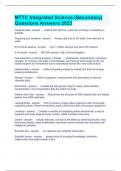
-
MTTC Integrated Science (Secondary) Questions Answers 2023
- Exam (elaborations) • 15 pages • 2023
- Available in package deal
-
- $22.49
- 1x sold
- + learn more
MTTC Integrated Science (Secondary) Questions Answers 2023 Graticule slide marked with grid line, useful for counting or estimating a quantity Preparing acid solutions Always add acid to 2/3 water, then add rest of water # of Animal species over 1 million species and about 30 divisions # of insects 800,000 species, half of animal kingdom Characteristics of animal kingdom muliticellular, heterotrophic, reproduce sexually, do not have cell walls or chloroplasts, c...
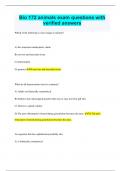
-
Bio 172 animals exam questions with verified answers
- Exam (elaborations) • 19 pages • 2024
- Available in package deal
-
- $9.99
- + learn more
Bio 172 animals exam questions with verified answers Which of the following is (are) unique to animals? A) the structural carbohydrate, chitin B) nervous and muscular tissue C) heterotrophy D) gametes B) nervous and muscular tissue What do all deuterostomes have in common? A) Adults are bilaterally symmetrical. B) Embryos have pharyngeal pouches that may or may not form gill slits. C) All have a spinal column. D) The pore (blastopore) formed during gastrulation becomes the anu...
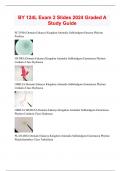
-
BY 124L Exam 2 Slides 2024 Graded A Study Guide
- Exam (elaborations) • 11 pages • 2024
- Available in package deal
-
- $13.99
- + learn more
SCYPHA Domain Eukarya Kingdom Animalia Subkindgom Parazoa Phylum Porifera HYDRA Domain Eukarya Kingdom Animalia Subkindgom Eumetazoa Phylum Cnidaria Class Hydrazoa OBELIA Domain Eukarya Kingdom Animalia Subkindgom Eumetazoa Phylum Cnidaria Class Hydrazoa OBELIA MEDUSA Domain Eukarya Kingdom Animalia Subkindgom Eumetazoa Phylum Cnidaria Class Hydrazoa PLANARIA Domain Eukarya Kingdom Animalia Subkindgom Eumetazoa Phylum Platyhelminthes Class Turbellaria CLONORCHIS SINENSIS Doma...
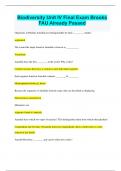
-
Biodiversity Unit IV Final Exam Brooks FAU Already Passed
- Exam (elaborations) • 48 pages • 2024
-
- $11.99
- + learn more
Organisms in Phylum Annelida are distinguishable by their _________ bodies. segmented The worm-like shape found in Annelids is known as __________. Vermiform Annelids have the best ________ in the world. Why is this? Coelom, because they have a coelom in each individual segment. Each segment found in Annelids contains ________ & ________ Metanephridia [kidneys], hearts Because the segments of Annelids look the same, they are described as displaying Homonomous metamerism Metameres are ...
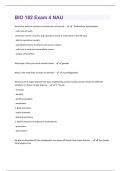
-
BIO 182 Exam 4 NAU Questions And Answers With Verified Solutions
- Exam (elaborations) • 15 pages • 2024
- Available in package deal
-
- $7.99
- + learn more
Be familiar with the common characteristics of animals. - - Multicellular heterotrophs - cells lack cell walls -most have nerves, muscles, and capacity to move at some point in the life cycle - able to reproduce sexually - specialized sensory structures and nervous system - cells exist in extensive extracellular matrix - unique cell junctions What type of life cycle do all animals show? - gametic What is the most likely ancestor of animals? - choanoflagellates What are the 3 major featu...
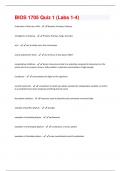
-
BIOS 1705 Quiz 1 (Labs 1-4) Questions And Answers Graded A+
- Exam (elaborations) • 8 pages • 2024
- Available in package deal
-
- $7.99
- + learn more
3 domains of the tree of life - Bacteria, Archaea, Eukarya 4 kingdoms of eukarya - Protista, Plantae, Fungi, Animalia arm - use to safely carry the microscope coarse adjustment knob - use to focus at low power ONLY competative inhibition - when molecules similar to a substrate compete for placement on the active site of an enzyme, Vmax is still possible is substrate concentration is high enough Condenser - concentrates the light on the specimen control treatment - a treatment in which you...
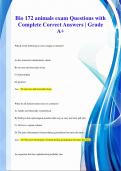
-
Bio 172 animals exam Questions with Complete Correct Answers | Grade A+
- Exam (elaborations) • 20 pages • 2024
- Available in package deal
-
- $12.49
- + learn more
Which of the following is (are) unique to animals? A) the structural carbohydrate, chitin B) nervous and muscular tissue C) heterotrophy D) gametes Ans: B) nervous and muscular tissue What do all deuterostomes have in common? A) Adults are bilaterally symmetrical. B) Embryos have pharyngeal pouches that may or may not form gill slits. C) All have a spinal column. D) The pore (blastopore) formed during gastrulation becomes the anus. Ans: D) The pore (blastopore) formed during gastrul...
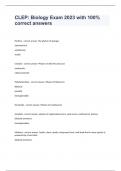
-
CLEP: Biology Exam 2023 with 100% correct answers
- Exam (elaborations) • 24 pages • 2023
- Available in package deal
-
- $16.49
- + learn more
Porifera - correct answer -the phylum of sponges asymmetrical ectothermic sessile Cnidaria - correct answer -Phylum of Jelly fish and coral exothermic radial symmetry Platyhelminthes - correct answer -Phylum of flatworms Bilateral parasitic hermaphroditic Nematoda - correct answer -Phylum of roundworms Annelida - correct answer -phylum of segmented worms: sand worms, earthworms, leeches bilateral symmetry hermaphrodites Mollusca - correct answer -(snails, clams, squids...
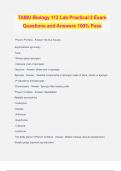
-
TAMU Biology 112 Lab Practical 2 Exam Questions and Answers 100% Pass
- Exam (elaborations) • 23 pages • 2024
- Available in package deal
-
- $13.49
- + learn more
TAMU Biology 112 Lab Practical 2 Exam Questions and Answers 100% Pass Phylum Porifera - Answer- No true tissues Asymmetrical symmetry Taxa: -Silicea (glass sponges) -Calcarea (rest of sponges) Osculum - Answer- Water exit in sponges Spicules - Answer- -Skeletal components of sponges made of silica, calcite or spongin -Produced by amoebocytes Choanocytes - Answer- Spong's filter-feeding cells Phylum Cnidaria - Answer- Diploblastic Radially symmetrical Cnidocytes Classes: -Anthozoa...

How much did you already spend on Stuvia? Imagine there are plenty more of you out there paying for study notes, but this time YOU are the seller. Ka-ching! Discover all about earning on Stuvia


